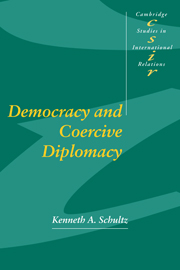Preface
Published online by Cambridge University Press: 08 October 2009
Summary
In March 1999, as the first draft of this manuscript was being completed, the United States and its allies launched an air war against Yugoslavia over its treatment of ethnic Albanians in Kosovo. While this conflict was fascinating for many reasons, one aspect that particularly struck me was President Clinton's decision to announce, both before and during the air campaign, that he had no intention of introducing ground troops into Kosovo. Why Clinton was reluctant to use ground forces is not very puzzling. Given the costs that were anticipated and the lack of strong public support, any such operation would have been politically and militarily quite risky. The decision to announce his intentions publicly, however, came under strong criticism, especially when the air campaign failed to produce immediate results. “How does it make sense,” asked Republican Senator John McCain, “to tell your enemy before you go into a conflict that you will not exercise whatever options are necessary to achieve victory?” (US Senate 1999). Asked this very question in an April 19 Newsweek interview, Vice President Al Gore defended the president's strategy: “We have an obligation to candidly communicate with the American people about what we're doing and why, and what we're not doing and why. And if candor and clarity are costs of democracy, it's not the first time.”
This book explores how the transparent political process within democracies influences the way these states use threats of force, how the targets of those threats respond, and whether or not crises are resolved short of war. While Gore's response reflects a common perception that the requirements of open deliberation and debate impose liabilities on democratic foreign policy, my findings suggest a more mixed and, on balance, more positive conclusion.
- Type
- Chapter
- Information
- Democracy and Coercive Diplomacy , pp. xiii - xviPublisher: Cambridge University PressPrint publication year: 2001



